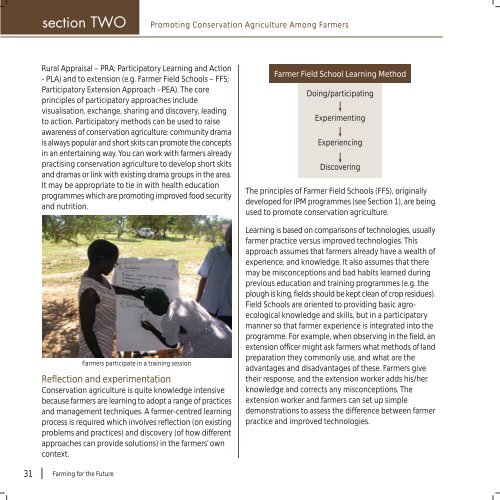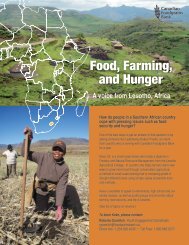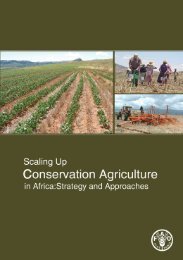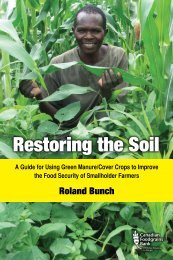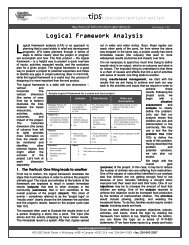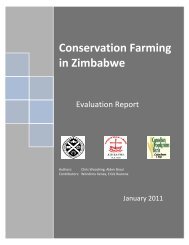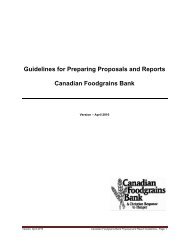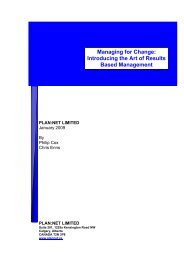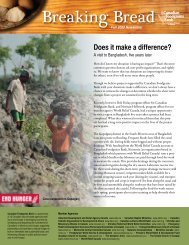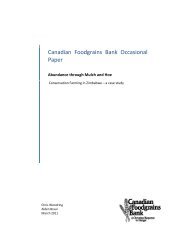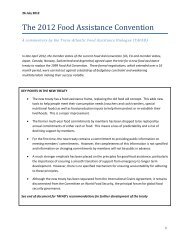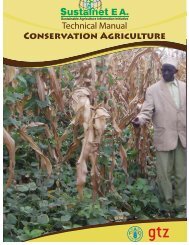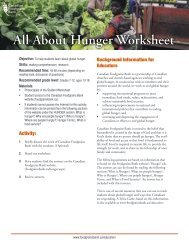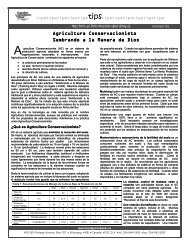A Guide to Conservation Agriculture in Zimbabwe - Canadian ...
A Guide to Conservation Agriculture in Zimbabwe - Canadian ...
A Guide to Conservation Agriculture in Zimbabwe - Canadian ...
Create successful ePaper yourself
Turn your PDF publications into a flip-book with our unique Google optimized e-Paper software.
section TWO<br />
Promot<strong>in</strong>g <strong>Conservation</strong> <strong>Agriculture</strong> Among Farmers<br />
Rural Appraisal – PRA; Participa<strong>to</strong>ry Learn<strong>in</strong>g and Action<br />
- PLA) and <strong>to</strong> extension (e.g. Farmer Field Schools – FFS;<br />
Participa<strong>to</strong>ry Extension Approach - PEA). The core<br />
pr<strong>in</strong>ciples of participa<strong>to</strong>ry approaches <strong>in</strong>clude<br />
visualisation, exchange, shar<strong>in</strong>g and discovery, lead<strong>in</strong>g<br />
<strong>to</strong> action. Participa<strong>to</strong>ry methods can be used <strong>to</strong> raise<br />
awareness of conservation agriculture: community drama<br />
is always popular and short skits can promote the concepts<br />
<strong>in</strong> an enterta<strong>in</strong><strong>in</strong>g way. You can work with farmers already<br />
practis<strong>in</strong>g conservation agriculture <strong>to</strong> develop short skits<br />
and dramas or l<strong>in</strong>k with exist<strong>in</strong>g drama groups <strong>in</strong> the area.<br />
It may be appropriate <strong>to</strong> tie <strong>in</strong> with health education<br />
programmes which are promot<strong>in</strong>g improved food security<br />
and nutrition.<br />
Farmers participate <strong>in</strong> a tra<strong>in</strong><strong>in</strong>g session<br />
Reflection and experimentation<br />
<strong>Conservation</strong> agriculture is quite knowledge <strong>in</strong>tensive<br />
because farmers are learn<strong>in</strong>g <strong>to</strong> adopt a range of practices<br />
and management techniques. A farmer-centred learn<strong>in</strong>g<br />
process is required which <strong>in</strong>volves reflection (on exist<strong>in</strong>g<br />
problems and practices) and discovery (of how different<br />
approaches can provide solutions) <strong>in</strong> the farmers’ own<br />
context.<br />
Farmer Field School Learn<strong>in</strong>g Method<br />
Do<strong>in</strong>g/participat<strong>in</strong>g<br />
Experiment<strong>in</strong>g<br />
Experienc<strong>in</strong>g<br />
Discover<strong>in</strong>g<br />
The pr<strong>in</strong>ciples of Farmer Field Schools (FFS), orig<strong>in</strong>ally<br />
developed for IPM programmes (see Section 1), are be<strong>in</strong>g<br />
used <strong>to</strong> promote conservation agriculture.<br />
Learn<strong>in</strong>g is based on comparisons of technologies, usually<br />
farmer practice versus improved technologies. This<br />
approach assumes that farmers already have a wealth of<br />
experience, and knowledge. It also assumes that there<br />
may be misconceptions and bad habits learned dur<strong>in</strong>g<br />
previous education and tra<strong>in</strong><strong>in</strong>g programmes (e.g. the<br />
plough is k<strong>in</strong>g, fields should be kept clean of crop residues).<br />
Field Schools are oriented <strong>to</strong> provid<strong>in</strong>g basic agroecological<br />
knowledge and skills, but <strong>in</strong> a participa<strong>to</strong>ry<br />
manner so that farmer experience is <strong>in</strong>tegrated <strong>in</strong><strong>to</strong> the<br />
programme. For example, when observ<strong>in</strong>g <strong>in</strong> the field, an<br />
extension officer might ask farmers what methods of land<br />
preparation they commonly use, and what are the<br />
advantages and disadvantages of these. Farmers give<br />
their response, and the extension worker adds his/her<br />
knowledge and corrects any misconceptions. The<br />
extension worker and farmers can set up simple<br />
demonstrations <strong>to</strong> assess the difference between farmer<br />
practice and improved technologies.<br />
31 Farm<strong>in</strong>g for the Future


